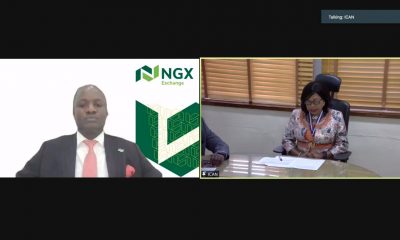Economy
Expert Highlights Vital Skills Accountants Must Acquire

An expert in the accounting profession, Mr David Lyford-Smith, has advised accountants in Nigeria to acquire some certain skills if they intend to remain highly competitive in the future.
Mr Lyford-Smith, the Technical Manager in the Tech Faculty of the Institute of Chartered Accountants in England and Wales (ICAEW) said at the 49th Annual Accountants Conference organized by the Institute of Chartered Accountants in Nigeria (ICAN) that one of the skills is adaptability.
He said the adaptability skill was needed by accounting professionals considering how technology has taken over the profession, explaining that professionals need to adapt to changing standards in the industry, especially as it adjusts to emerging technology. He noted that the accounting profession was already reacting by creating exams and learning materials to produce knowledgeable newly-qualified accountants.
While presenting his paper at the plenary session titled Disruptive Innovations: Challenges and Opportunities in the Accounting Profession, Mr Lyford-Smith said, “Nigeria has a young and growing accountancy profession and this means there is a huge opportunity for students and current accountants to be trained today for the needs of the near future. In the very near future, the number one skill for accounting will be adaptability.
“Accountants won’t have to be technologists but must be able to talk to them; they need to be able to meet in the middle.
“These effects are already being felt. The Big 4 – KPMG, Ernst & Young (EY), Deloitte and PwC- are already struggling to keep their juniors occupied while teaching them the basics.”
At the conference held at the International Conference Centre, Abuja between September 9 and 13, 2019 and themed Building Nigeria for Sustainable Growth and Development, Mr Lyford-Smith said other skills to acquire were statistical thinking and understanding data.
“Understanding statistical thinking is a key skill for auditors interpreting analytics data. Software may be able to process huge amounts of information, but interpreting the results correctly means taking a sceptical interpretation and understanding concepts such as margins of error, outliers, sampling bias, and so on.
“Accountants still need to be able to prioritise useful tests above interesting ones and be able to tell the difference,” he added.
Speaking on the transformational trends in accounting aptly referred to as the ‘ABCDs of accounting technology’, Mr Lyford-Smith explained that these have been the focus of the ICAEW’s tech work over the last couple of years.
The ABCDs of accounting technology are artificial intelligence (AI), blockchain, cybersecurity and data, saying, “Once accountants adapt to changing trends, they will realise how much time and resources can be saved.”
For instance, AI involves automating even non-repetitive tasks, replicating accountants’ intuition and turbo-charging accountants’ judgment. With blockchain, there is no need to reconcile books, although the accountant will still need to assess the economic value of assets,” he added.
The Editor and Blogger, Mr Lyford-Smith on ICAEW’s Excel Community however noted that cyber risk was high but explained that there was a need for new controls around detection, response and resilience.
With the recent focus on Big Data, new sources of non-financial data are available to provide hard evidence for decisions, identify how data supports specific decisions and provides value, as well as check the integrity and quality of new sources of data.
The Excel specialist, who has strong interest in digitalization of taxes, emphasized that technology was important for audit and taxation, as it provided simplification and could be tailored according to each country’s specific circumstances.
He disclosed that the ICAEW’s Digital Tax report looked at how tax authorities in 12 countries – including Nigeria – are making use of the opportunities to improve efficiency and reduce compliance costs.
Economy
Bears Recapture Local Bourse, Inflict N77bn Loss on Investors

By Dipo Olowookere
The Nigerian Exchange (NGX) Limited suffered a 0.11 per cent loss on Thursday after the bears made a comeback after being chased away by the bulls a day earlier.
The local bourse was under attack despite a positive market breadth index and strong investor sentiment after it ended with 29 appreciating stocks and 23 depreciating stocks.
Business Post observed that profit-taking in some mid-equities plunged Customs Street during the trading session, with Fidson shedding 9.60 per cent to trade at N17.90.
Ecobank Nigeria depreciated by 9.51 per cent to sell for N31.40, Guinea Insurance lost 8.33 per cent to quote at 66 Kobo, Prestige Assurance slipped by 7.50 per cent to N1.11, and Sunu Assurances crashed by 6.44 per cent to N5.52.
On the flip side, PZ Cussons gained 10.00 per cent to settle at N32.45, Oando improved by 10.00 per cent to N52.80, Honeywell Flour appreciated by 9.96 per cent to N13.03, Caverton jumped by 9.80 per cent to N2.69, and Livestock Feeds rose by 9.35 per cent to N6.90.
Yesterday, the energy counter appreciated by 0.88 per cent and was the only gainer among the key sectors of the market.
The insurance sector went down by 0.92 per cent, the banking index depreciated by 0.75 per cent, the industrial goods space crumbled by 0.43 per cent, and the consumer goods sector lost 0.17 per cent, while the commodity counter closed flat.
Consequently, the All-Share Index (ASI) decreased by 123.53 points to 107,675.46 points from 107,798.99 points and the market capitalisation retreated by N77 billion to N67.102 trillion from N67.179 trillion.
A total of 423.4 million equities worth N9.6 billion were traded in 11,112 deals on Thursday compared with the 245.5 million equities valued at N8.4 billion transacted in 10,098 deals on Wednesday, representing a rise in the trading volume, value, and number of deals by 72.46 per cent, 14.29 per cent and 10.04 per cent, apiece.
The activity chart was topped by FCMB with 102.3 million stocks valued at N1.1 billion, Zenith Bank transacted 33.3 million equities worth N1.6 billion, Access Holdings exchanged 31.2 million shares for N801.9 million, Jaiz Bank traded 24.4 million equities worth N82.0 million, and Caverton sold 20.9 million stocks valued at N54.6 million.
Economy
FG, States, LGAs Share N1.703trn as January 2025 Revenue Rises 19%

By Adedapo Adesanya
The federal government, the 36 states, and the 774 local government areas of the federation have shared a total of N1.703 trillion in revenue generated in January 2025.
This amount represents an increase of 19.6 per cent or N279 billion from the N1.424 trillion generated in December 2024.
This is according to a press release by the Director (Press and Public Relations) at the Office of the Accountant General of the Federation, Mr Bawa Mokwa, on Thursday,
The N1.703 trillion total distributable revenue comprises N749.727 billion in statutory revenue, N718.781 billion in Value Added Tax revenue, N20.548 billion from the Electronic Money Transfer Levy, and N214 billion in augmentation.
The statement was based on a communique issued by the Federation Account Allocation Committee (FAAC) after its monthly meeting for February 2025.
It noted that the total gross revenue amounted to N2.641 trillion, which was slightly higher than the N2.310 trillion recorded in the previous month.
The total deduction for cost of collection was N107.786 billion while total transfers, interventions, refunds and savings was N830.663 billion.
It was disclosed that the federal government received N552.591 billion, state governments were allocated N590.614 billion, and the Local Government Councils received N434.567 billion, while an additional N125.284 billion was shared with benefiting states as derivation revenue as 13 per cent of mineral revenue.
The statement further noted that the gross statutory revenue for the month under review stood at N1.848 trillion, an increase of N622.125 billion from the N1.226 trillion recorded a month earlier.
Gross VAT revenue for the month was N771.886 billion, rising by N122.325 billion from N649.561 billion in December.
From the N749.727 billion statutory revenue, the federal government got N343.612bn, the state governments were given N174.285 billion, and the councils received N134.366 billion, while N97.464 billion was also allocated to states benefiting from derivation revenue.
Further, from the N718.781 billion VAT revenue, the federal government received N107.817 billion, state governments were got N359.391 billion, and Local Government Councils shared N251.573 billion.
For the N20.548 billion Electronic Money Transfer Levy (EMTL), the federal government received N3.082 billion, state governments received N7.192 billion, and Local Government Councils received N10.274 billion.
The N214 billion augmentation was shared with the federal government receiving N98.080 billion, state governments receiving N49.747 billion, and Local Government Councils receiving N38.353 billion, while N27.820 billion was shared among the benefiting states as derivation revenue.
The communique also highlighted increases in collections from VAT, Petroleum Profit Tax, Companies Income Tax, Excise Duty, Import Duty, and CET Levies, while there was a significant decrease in EMTL and Oil and Gas Royalty receipts.
Economy
Oil Prices Jump as Trump Revokes Chevron’s Venezuela Licence

By Adedapo Adesanya
Oil prices rose more than 2 per cent on Thursday amid supply concerns after the US President, Mr Donald Trump, revoked a licence granted to US oil major, Chevron, to operate in Venezuela.
The news led Brent crude oil futures to spike by $1.53 or 2.1 per cent to $74.06 a barrel while the US West Texas Intermediate (WTI) crude oil futures increased by $1.64 or 2.4 per cent to $70.26.
The Chevron licence revocation means the company will no longer be able to export Venezuelan crude.
However, if Venezuelan state oil company, PDVSA, exports oil previously exported by Chevron, US refineries will be unable to buy it because of U.S. sanctions.
President Trump said this was due to the lack of electoral reform in the South American country alongside with insufficient action on migration.
Chevron has been exporting around 240,000 barrels of Venezuelan crude to the US daily after former US President Joe Biden granted them a waiver.
The amount constitutes around 25 per cent of the country’s total oil production and generates substantial revenues that stay in the Venezuelan economy.
Meanwhile, market analysts noted that the move could also lead to the negotiation of a fresh agreement between the Chevron and PDVSA to export crude to destinations other than the US.
This development could also impact the Organisation of the Petroleum Exporting Countries and its allies, OPEC+, to which Venezuela is a member.
Chevron’s exit could reduce Venezuela oil’s production, giving OPEC+ capacity to increase output.
However, investors were still keeping an eye on signs of a potential peace deal in Ukraine, which could result in higher Russian oil flows.
President Trump said Ukrainian President Volodymyr Zelenskiy will visit the US on Friday to sign an agreement on rare earth minerals.
However, the Ukrainian leader said the success of talks would hinge on continued US aid.
The market was pressured by news that US economic growth slowed in the fourth quarter amid cold weather and concerns that tariffs will hurt spending through higher prices.
-

 Feature/OPED5 years ago
Feature/OPED5 years agoDavos was Different this year
-
Travel/Tourism9 years ago
Lagos Seals Western Lodge Hotel In Ikorodu
-

 Showbiz2 years ago
Showbiz2 years agoEstranged Lover Releases Videos of Empress Njamah Bathing
-

 Banking7 years ago
Banking7 years agoSort Codes of GTBank Branches in Nigeria
-

 Economy2 years ago
Economy2 years agoSubsidy Removal: CNG at N130 Per Litre Cheaper Than Petrol—IPMAN
-

 Banking2 years ago
Banking2 years agoFirst Bank Announces Planned Downtime
-

 Sports2 years ago
Sports2 years agoHighest Paid Nigerian Footballer – How Much Do Nigerian Footballers Earn
-

 Technology4 years ago
Technology4 years agoHow To Link Your MTN, Airtel, Glo, 9mobile Lines to NIN



















